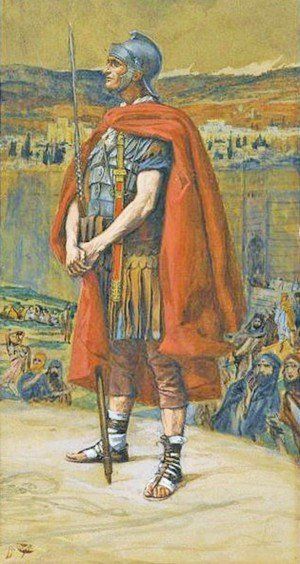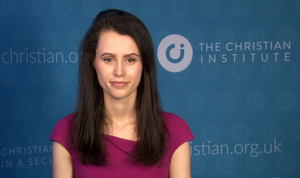‘Oh, give thanks to the Lord, for he is good! For his mercy endures forever.’
According to ancient Jewish tradition, the annual celebration of the Passover included the recitation of Psalm 118. with its opening and closing refrain: ‘Oh, give thanks to the Lord, for he is good! For his mercy endures forever.’
In this psalm Israel’s king, their nation’s ‘chief cornerstone’, offers a threefold testimony of thanksgiving to the Lord for his covenant love.
Deliver from fear
First the king declares that the Lord delivered him from the fear of those who hated him. Join with the congregation of Israel by confirming these words of your anointed king: ‘It is better to trust in the Lord than to put confidence in man … [or] in princes’ (vv. 8-9).

Consider God and man in terms of their ability to provide a safe haven for living in the face of threats that come from hateful people. Man can hardly protect from the assaults of the wicked against the righteous. Much less can he control the slanderous reports of the wicked.
But God can. Jesus was confident that no one could do anything to him except it be given them of his heavenly Father.
So why trust men rather than God? When troubles threaten, man can provide no certain help. But if you trust the Lord, you can declare with the psalmist: ‘Oh, give thanks to the Lord, for he is good! For his mercy endures forever.’
Intervene with power
In addition to delivering from fear, the Lord saves his people from the threat of many nations. Sometimes a coalition of enemies may set itself against the Lord and his people. Under David, neighbouring nations regularly rebelled against the rule of the Lord’s anointed representative.

This opposition of national coalitions climaxed when Roman soldiers joined with Jewish leaders to crucify Christ. The distress of the messianic king, threatened by his enemies, finds expression in this psalm in verses 10,12 and 14. This suffering saint is ‘surrounded’. Menacing bees swarm about him. Powerful nations threaten his life. But they fade away as quickly as they came. Like a fire that blazes hot for an instant and then dies into its own ashes, so his oppressors threaten but are suddenly brought to nothing.
It is the Lord who intervenes. Just as with Belshazzar, Nebuchadnezzar, Haman, and Herod the Lord overwhelms those who threaten the safety of his people.
This pattern of deliverance from death reaches its climax at the resurrection of Jesus Christ. Now death forever has lost its sting, and the grave its victory. Christ’s resurrection was not a lonely trek of a single individual. Jesus brought out from under the power of death all those who would believe in him through the ages.
So by faith you can join in a salute to the power of the Lord’ s right hand: ‘The voice of rejoicing and salvation is in the tents of the righteous; the right hand of the Lord does valiantly. The right hand of the Lord is exalted the right hand of the Lord does valiantly’ (w. 15-16).
If a person can give thanks to the Lord when facing the dark spectre of death, then he has come to understand that setbacks in the struggle of life are only temporary. So in everything he gives thanks.
Triumph with love
This remembrance of deliverance from death leads to the third testimony in this psalm. Despite the rejection of men, the Lord establishes his chosen one as the cornerstone of his kingdom (w. 17-25). He gives thanks not only for deliverance from death; he praises God for his covenant love that triumphs in life.
The king comes as a worshipper with his sacrifice of thanksgiving to the Lord. Rejected by men, he is accepted by God. The Lord’s intent is that he become the ‘chief cornerstone’ of his domain. All kingdom activities will rest upon him (v.22). Jesus applies this verse directly to himself when rejected by the religious leaders of his day (see Luke 20:17).
‘Oh, give thanks!’
Today is the day for thanksgiving, even as it was for Jesus Christ in the upper room with his disciples. As he celebrated the Last Supper, he remembered the words of this psalm once more. Jesus and his disciples ‘sang a hymn’ just before leaving (Matthew 26:30; Mark 14:26). Almost certainly the ‘hymn’ they sang was Psalm 118, since this psalm was the last of a series of psalms recited by the Jews during the celebration of the Passover meal.
Imagine Jesus on the evening preceding his death as he leads his disciples in these climactic words: ‘I shall not die, but live, and declare the works of the Lord.’ ‘The stone which the builders rejected has become the chief cornerstone.’
Only the Lord could transform the day of Christ’s crucifixion into a time of overwhelming victory. Even as Satan and his hosts did their worst, the Lord triumphed.
No wonder Christians today can offer a sacrifice of thanksgiving with such enthusiasm. It is not merely a matter of celebrating this nation’s great heritage. More than that, it is a time to give thanks for the great salvation Christ has accomplished for his people.
‘Oh, give thanks to the Lord, for he is good! For his mercy endures forever’ (v.29).
O. Palmer Robertson is the author of The Final Word and teaches at the African Bible College in Malawi, East Africa




















